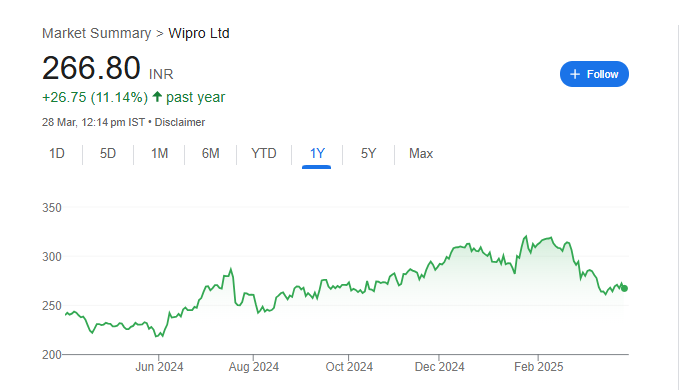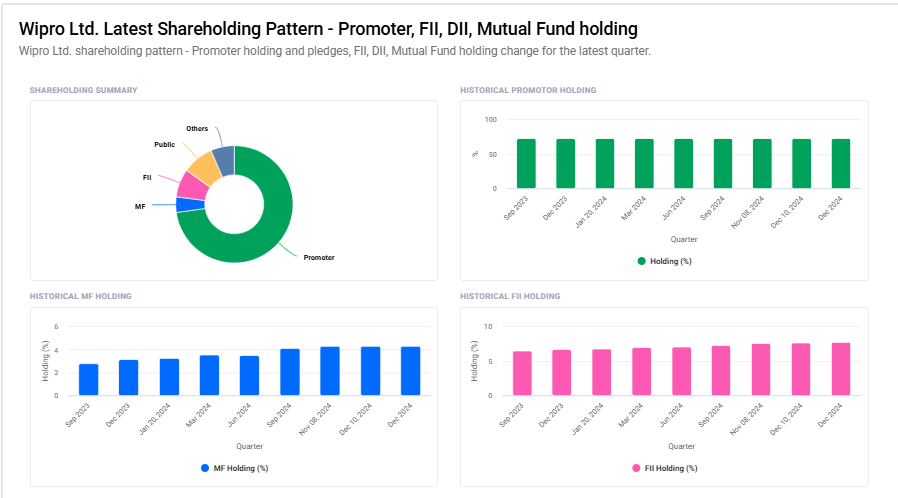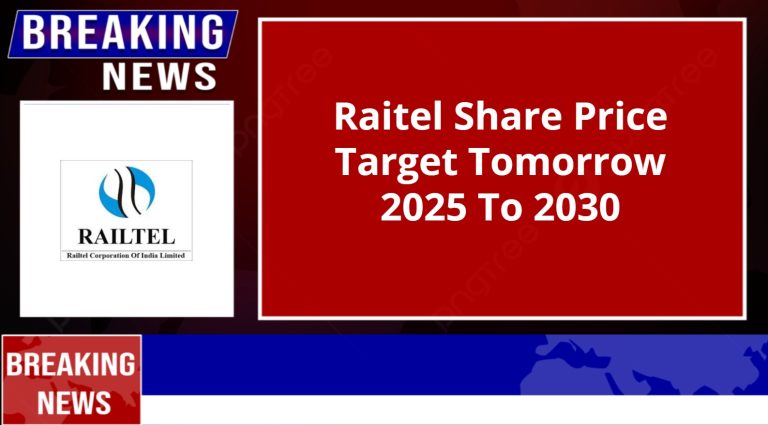Wipro Share Price Target Tomorrow 2025 To 2030
Wipro is one of India’s leading IT services companies, providing technology and consulting solutions globally. The company’s stock is a key player in the Indian IT sector and is listed on both the NSE and BSE. Wipro’s share price is influenced by factors like global IT spending, business deals, competition, and currency exchange rates. Investors closely watch its financial performance, innovation strategies, and client growth. Wipro Share Price on NSE as of 28 March 2025 is 266.80 INR.
Current Market overview of Wipro Share Price
- Open: 271.00
- High: 271.85
- Low: 265.90
- Previous Close: 272.20
- Volume: 5,511,925
- Value (Lacs): 14,708.57
- VWAP: 267.34
- Mkt Cap (Rs. Cr.): 279,448
- Face Value: 2
- UC Limit: 299.40
- LC Limit: 245.00
- 52 Week High: 324.60
- 52 Week Low: 208.50
Wipro Share Price Target Tomorrow 2025 To 2030
| Wipro Share Price Target Years | Wipro Share Price |
| 2025 | INR 325 |
| 2026 | INR 350 |
| 2027 | INR 380 |
| 2028 | INR 410 |
| 2029 | INR 440 |
| 2030 | INR 470 |
Wipro Share Price Chart

Wipro Shareholding Pattern
- Promoter: 72.8%
- FII: 7.8%
- DII: 10.7%
- Public: 8.7%

Key Factors Affecting Wipro Share Price Growth
-
Strong IT Services Demand
Wipro benefits from the increasing demand for digital transformation, cloud computing, cybersecurity, and artificial intelligence services. As businesses continue to invest in technology, Wipro’s revenue and growth prospects improve, positively impacting its share price. -
New Contracts & Client Expansion
Winning large IT deals from global clients adds to Wipro’s revenue and strengthens its market position. Expanding its client base in key industries like banking, healthcare, and retail can drive future growth and push the stock price higher. -
Global Economic Conditions
A strong global economy encourages businesses to spend more on IT services, boosting Wipro’s earnings. On the other hand, economic slowdowns or recessions may reduce IT spending, affecting the company’s revenue and stock price. -
Cost Management & Profit Margins
Efficient cost control, automation, and improving employee productivity help Wipro maintain healthy profit margins. If the company can optimize its expenses while growing revenue, it can improve investor confidence and drive share price appreciation. -
Technological Advancements & Innovation
Wipro’s investment in emerging technologies like AI, machine learning, and automation can differentiate it from competitors. Developing innovative solutions and staying ahead in the IT industry can lead to better growth opportunities and a higher stock valuation. -
Stock Buybacks & Dividends
Wipro regularly announces share buybacks and dividends, which boost investor confidence and provide returns. These actions reduce the number of shares in the market, increasing earnings per share (EPS) and supporting stock price growth. -
Rupee-Dollar Exchange Rate
Since Wipro earns a significant portion of its revenue from overseas markets, a weaker Indian Rupee against the US Dollar benefits the company’s earnings. A favorable exchange rate can improve profitability and positively impact the stock price.
Risks and Challenges for Wipro Share Price
-
Global Economic Slowdown
If the global economy weakens, businesses may cut back on IT spending, reducing demand for Wipro’s services. This could impact the company’s revenue growth and negatively affect its share price. -
Intense Competition in IT Industry
Wipro faces strong competition from other IT giants like TCS, Infosys, and global players such as Accenture and IBM. If Wipro fails to keep up with innovation and pricing strategies, it may lose market share, impacting investor confidence. -
Client Dependency & Deal Losses
A significant portion of Wipro’s revenue comes from a few key clients. If any major client reduces spending or switches to a competitor, it could affect Wipro’s earnings and stock price. -
Currency Fluctuations
Wipro earns a large share of its revenue in US Dollars, while many expenses are in Indian Rupees. A strong Rupee against the Dollar can lower earnings, affecting profitability and share price performance. -
Talent Acquisition & Retention
The IT sector relies heavily on skilled employees. High attrition rates, rising salaries, and talent shortages can increase costs and affect project delivery, potentially harming Wipro’s reputation and financials. -
Regulatory & Compliance Risks
Wipro operates in multiple countries, each with its own regulations, tax policies, and data protection laws. Any unfavorable changes in policies or failure to comply with legal requirements could result in penalties and affect business operations. -
Technology Disruptions & Cybersecurity Threats
Rapid advancements in technology and cybersecurity threats pose risks. If Wipro fails to adapt to new trends or faces security breaches, it could lose client trust, leading to lower revenue and a weaker share price.
Read Also:- KRN Heat Exchanger Share Price Target Tomorrow 2025 To 2030







